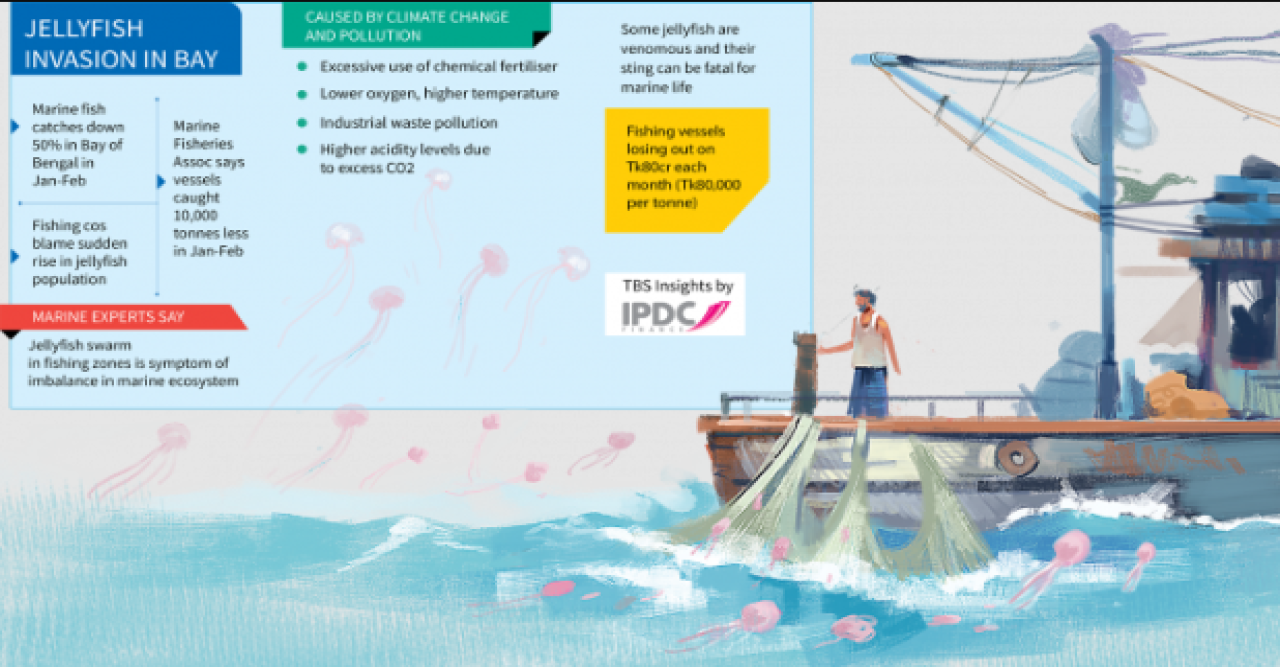
Marine catch halved as jellyfish invades Bay's fishing zones
Mohin Talukder প্রকাশিত: ১৯ ডিসেম্বর, ২০২৪, ০৯:০৭ এএম

Something unwelcome is coming up in the net of fishermen in the Bay of Bengal – jellyfish. These venomous, gelatinous creatures have swarmed the fishing zones of Bay of Bengal and are getting caught in their nets more than marine fish.
Fishing vessels caught 50% less marine fish in January and February this year than they did in the same period last year. Fishermen blame a sudden increase in jellyfish replacing marine fish in the nets.
As a result, many vessels are returning from deep-sea trips due to continuous losses, leaving many commercial fishing vessels idle along the Karnaphuli riverbanks and leaving sailors and crew members without jobs.
According to marine experts, jellyfish, which usually inhabit shorelines and bottoms, have moved into the mid-ocean layer due to decreased oxygen content, increased water salinity, and higher temperatures.
They said jellyfish are highly poisonous and pose a significant threat to fish resources, with "box jellyfish" being the most dangerous type. A swarm of jellyfish can drive other marine life away from their habitats.
However, heavy rain may reduce jellyfish abundance by lowering salinity, potentially increasing fish populations, said experts.
Nurul Qayyum Khan, president of the Bangladesh Marine Fisheries Association, told The Business Standard that most ocean-going fishing vessels were docked along the banks of the Karnaphuli River due to the scarcity of fish.
"A few vessels that venture out only manage to catch jellyfish. If this trend persists, the fishing industry will suffer significant losses, making ship management and bank loan repayment challenging," he added.
Md Shoukot Kabir Chowdhury, assistant director at the Marine Fisheries Office, acknowledged the significant decrease in fish catches, down to one-third of the usual amount.
Fishermen have expressed concern about the situation, he said, adding that his office was gathering more information and the issue is also being discussed at higher levels.
Bangladesh has an economic zone of approximately 1.18 lakh sq-km in the Bay of Bengal. Within this zone, Bangladesh extracts fish resources from three regions spanning about 24,000 sq-km. The distance of these areas from the coastline is about 100km.
Fishing industry reeling
The peak fishing period is October to February when a calm sea helps get an abundant catch.
However, during a visit to the Sadarghat area of Chattogram Sadar on Wednesday, hundreds of fishing vessels were spotted anchored along both banks of the Karnaphuli River.
Sailors of the anchored vessels said they usually harvest around 100 tonnes of fish per trip. However, since January, this amount has significantly dropped.
For instance, fishing vessel FV Chingri caught 81.85 tonnes of marine fish in the Bay in January and February this year, down from 161.67 tonnes in the same period last year.
According to the fisheries association, fishing vessels extracted 19,105 tonnes of fish from the deep sea in January 2023 and 17,549 tonnes in February.
Although data for January and February of this year had not been compiled yet, the association expected it to be less than half of the previous year's figures.
Officials at the organisation said the increased diesel prices since 2022 have significantly raised fishing costs, with fuel expenses alone rising from Tk65 lakh to Tk1.10 crore for each fishing trip (lasting 20-22 days).
Moshiur Rahman Chowdhury, secretary general of the organisation, said good quality fish is currently scarce in the sea, and the poor catch is not enough to support the operational costs for fishing vessels.
"Around 10,000 less tonnes of fish are being harvested every month, with the average price per tonne being Tk80,000. This results in fishing vessels missing out on approximately Tk80 crore worth of fish every month," he added.
According to the Marine Fisheries Office, Bangladesh caught 7.20 lakh tonnes of marine fish in the fiscal year 2022-23, followed by 7.35 lakh tonnes the previous fiscal.
What experts say
Sayedur Rahman Chowdhury, professor at the Institute of Marine Sciences, University of Chittagong, said a surge in jellyfish indicates sea pollution, caused by factors like excessive chemical fertilisers and untreated factory waste dumped into rivers.
He said climate change is also a cause of increasing ocean acidity due to excess carbon dioxide. This situation poses a threat to both traditional and commercial fishing sectors.
"However, heavy rainfall may temporarily ease the problem by diluting pollution, but long-term solutions require serious attention to reducing ocean pollution and mitigating climate change effects," the professor added.
Towhida Rashid, director general of the Bangladesh Oceanographic Research Institute, told TBS that the observed increase in jellyfish is a clear sign of rising pollution in the sea.
The continuous discharge of polythene, waste, chemicals, and other harmful substances into the sea through canals and rivers are increasing the problem, she said. Efforts are underway to reduce beach pollution, she added.
"However, tackling ocean pollution poses greater challenges and requires increased vigilance and awareness at all levels," she mentioned.
